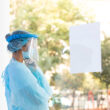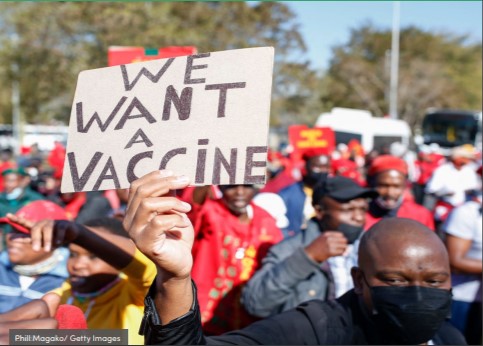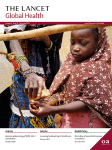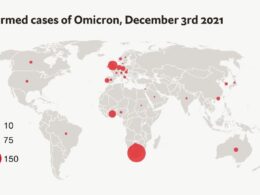Analysis shows very low full coverage in the poorest countries — in some under 1% of the population are fully vaccinated.
The Independent Panel
November, 2021
Selected Infographic (or image)
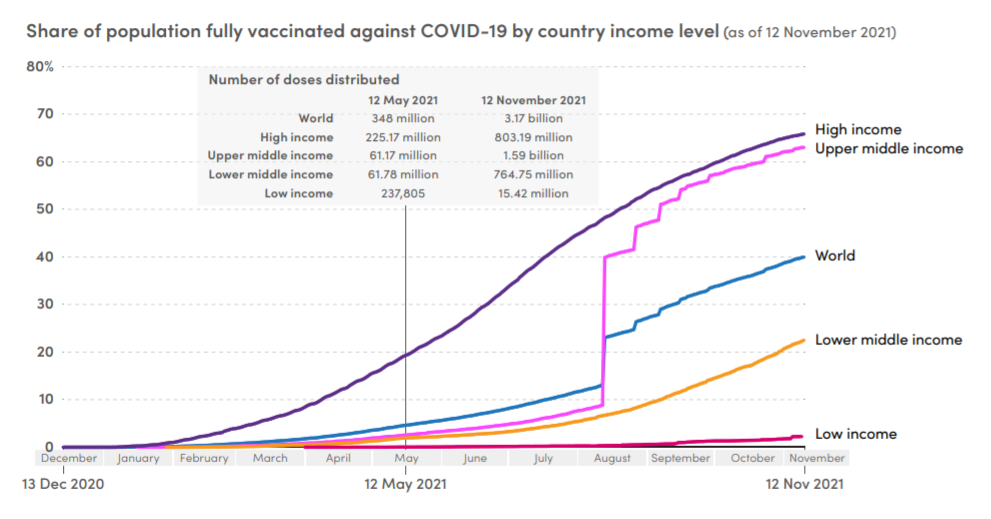
Key messages
More than 67% of the population of all high-income countries has been fully vaccinated against COVID-19, but in low-income countries fewer than 5% of people have received even one dose, and that figure hovers even lower in many.
World Health Organization (WHO) targets call for 40% of the population of each country to be fully vaccinated by the end of 2021 and 70% by mid-2022. These targets represent a minimum achievable goal based on vaccine supply forecasts — clearly vaccination rates would need to be far higher to protect health systems from overload.
Yet even so, the world is failing to meet them. On the current track, 75 countries will miss the 40% target set for the end of this year.
The Independent Panel called for high-income countries with an adequate supply pipeline to redistribute at least one billion vaccine doses to LMICs by 1 September 2021.
They did not meet that target. As of 16 November, 1,494 billion doses have been committed through the Advance Market Commitment (AMC) window of the COVAX Facility, of which 256.5 million had been delivered.3
Meanwhile, the capacity of low- and middle-income countries to purchase vaccines is squeezed by confidential high-cost deals between manufacturers and wealthy countries as they add booster doses to their immunization programmes, despite powerful arguments against this on equity grounds.4, 5
“How many more deaths must it take before the … excess vaccines in the possession of the advanced countries of the world will be shared with those who [have] simply no access to vaccines?” — Prime Minister Mia Mottley of Barbados, at the 76th UN General Assembly
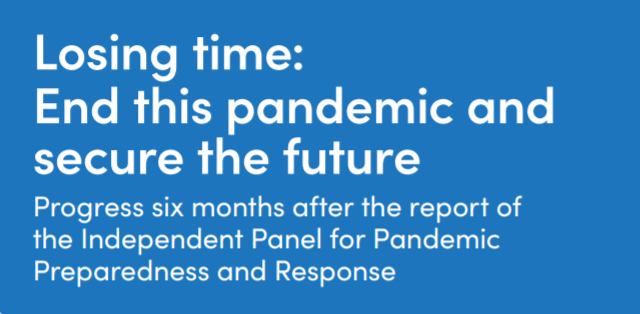
22 November 2021, LONDON — Reform on pandemic preparedness and response is underway, but to end this pandemic and prepare for the next global health threat, Heads of State and Government must come together to make faster progress.
Reform on pandemic preparedness and response is underway, but to end this pandemic and prepare for the next global health threat, Heads of State and Government must come together to make faster progress.
In a six-month accountability report, the former Co-Chairs of The Independent Panel for Pandemic Preparedness and Response assess the linked areas of leadership and governance, financing, equity, a new legal instrument, and a stronger WHO.
The Co-Chairs presented their findings today in the new report titled Losing Time: End this pandemic and secure the future, during a Chatham House event.
“ The world now needs these conversations to come together — especially at the UN General Assembly, where Heads of State and Government can declare their commitments and a pathway to a more secure world, including to a new Global Health Threats Council to provide much needed leadership and accountability.”
In May 2021, Her Excellency Ellen Johnson Sirleaf and the Right Honourable Helen Clark issued the Independent Panel’s findings following a nine-month deep-dive into the global and national response to COVID-19. They recommended immediate actions to end COVID-19 and a package of international, interlinked reform solutions intended to stop a future outbreak from becoming another devastating pandemic. In today’s report, they summarize progress on each recommendation in a comprehensive dashboard.
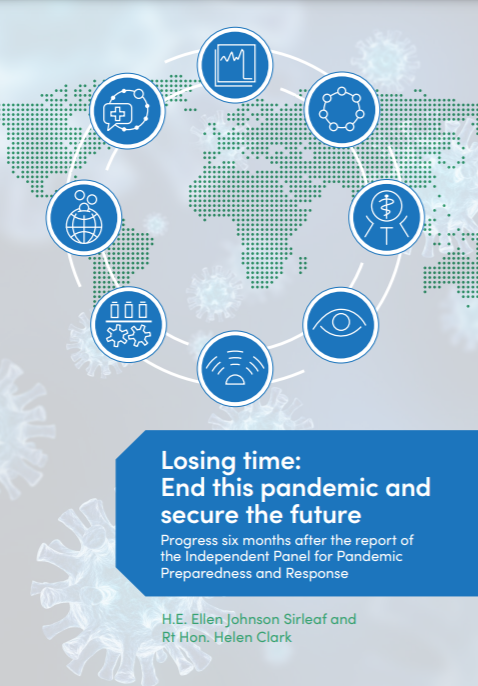
Uneven and fragmented efforts
The former Co-Chairs find uneven and sometimes fragmented efforts as the pandemic continues at pace.
They note that in just the six months since tabling their plan for action at least 90 million more people have contracted COVID and 1.65 million more people have died — and those are only the illnesses and deaths that have been recorded.
in just the six months … at least 90 million more people have contracted COVID and 1.65 million more people have died …
Of grave urgent concern remains vaccine inequity — which has changed very little since May 2021. Analysis shows very low full coverage in the poorest countries — in some under 1% of the population are fully vaccinated.
“ Our Panel calculated that there were at least one billion doses available to redistribute to low-income countries by 1 September this year,” said Her Excellency Ellen Johnson Sirleaf.
“ Yet while wealthy countries have made public pledges, just a fraction of redistributed doses have actually been delivered. The idea that a poor health worker is unprotected while the healthy and wealthy receive booster doses should present a deep moral quandary. To this there is only one solution — vaccine equity.”
… very low full coverage in the poorest countries — in some under 1% of the population are fully vaccinated.
The former Co-Chairs say that global health cannot be left hostage to a pharmaceutical industry which buys up patents and develops them in the interest of making profits.
They say that the development of a true end-to-end global public goods model remains the answer.
The report also warns that vaccine pledges can be soured by inconsistent delivery and dumping of near-expired vaccines — creating “a wasted opportunity to protect people.”
Some progress, much more to be done
With regard to specific progress and the work remaining, the Co-Chairs point to:
Leadership and Governance
- The UN Secretary General, António Guterres, stated to the U.S.-hosted Global COVID-19 Summit in September that “The recommendations of the Independent Panel for Pandemic Preparedness and Response must be a starting point for urgent reforms to strengthen the global health architecture.”
- Growing momentum for a UN special summit, with support from many countries and the Global Pandemic Preparedness Monitoring Board
- Statements in support of a new leader-led Global Health Threats Council, from Heads of State and Government and the G2O High-level Independent Panel on Financing the Global Commons for Pandemic Preparedness and Response (G20 HLIP)
- The report stresses that “governance without finance lacks teeth; and finance without governance lacks accountability.” The Independent Panel recommended that the Global Health Threats Council should have the task of allocating and monitoring funding from a new financing mechanism to existing regional and global institutions which can support development of pandemic preparedness and response capacities.
- The report notes growing convergence on the need to raise new financing for pandemic preparedness (of at least US$10 billion annually), including from the G20 HLIP, and the United States and Norway proposal for a Financial Intermediary Fund.
- The report also underscores the importance of having a pool of response funding — in May the Panel recommended that up to US$ 100 billion be made available in case of pandemic threat.
Equity for vaccines, diagnostics and treatments
- Progress includes the pledged donations of vaccine through 2022, though delivery must be planned, faster, and carried out transparently
- The announcements of new mRNA vaccine production hubs in Latin America and on the African continent
- Recent announcements about the latest oral antivirals becoming available to several dozen countries through the Medicines Patent Pool
Strengthening WHO and a Pandemic Treaty
- On the need for better surveillance and more rapid information sharing, the Co-Chairs welcome the new pathogen sharing and digital surveillance institutes being established in Switzerland and Germany.
- The report notes the continued need for a much larger portion of WHO funds to come from assessed contributions rather than being earmarked.
- WHO Member State Working Groups are discussing the Panel’s recommendations for strengthening and more sustainably financing WHO. The World Health Assembly (WHA) Special Session this month will focus on whether to launch negotiations for new legal instruments, and reforms to WHO will be considered at the regular WHA session next May.
Purpose, urgency, results
The Co-Chairs warn however about the potential for protracted discussion at the World Health Assembly and the United Nations when the need for reforms is urgent, and ask Member States to work with purpose towards real results that will protect people.
“ We urge Member States to spend less time debating commas in committees while a pandemic still rages, people are dying, and a new pandemic threat could arise anytime and anywhere,” said Helen Clark.
Overall, the report underscores that more focused and coherent work be done on a reform package with urgency. The Co-Chairs stress that the reforms required now can both contribute to ending the current pandemic and preventing another.
In their preface, the Co-Chairs write that much of the groundwork for reforms has been done and that it’s now imperative to seize the moment to make change.
“ What is needed now is for countries to make a final push so that the opportunity to create a safer world does not slip through our fingers. We ask: if this pandemic representing a threat to the health and wellbeing of humanity worldwide cannot catalyse real change, what will?”
For more information:
The report Losing Time: End this pandemic and secure the future is available at
www.TheIndependentPanel.org , as are all Independent Panel materials.
Originally published at https://mailchi.mp.
ORIGINAL PUBLICATION (excerpted below)
________________________________________________________

Homepage – The Independent Panel for Pandemic Preparedness and Response
Homepage An Evidence-based Quest to Protect Human Health © WHO New: the Co-Chairs’ six month accountability report …theindependentpanel.org
Losing time: End this pandemic and secure the future
Progress six months after the report of the Independent Panel for Pandemic Preparedness and Response
H.E. Ellen Johnson Sirleaf and Rt Hon. Helen Clark
Preface (excerpted)
Six months ago, we presented the report of the Independent Panel for Pandemic Preparedness and Response to the World Health Assembly and the world at large. We were honoured to co-chair the Panel and to work with eleven distinguished leaders on a meticulous analysis of the international response to COVID-19 and on recommendations on what needed to change.
We recommended a package of reforms required to help stop a future outbreak from becoming a pandemic, addressing leadership and accountability, governance, financing, equity and global public goods, and WHO’s authority and independence.
We also recommended urgent actions to end the devastation of COVID-19. There is progress, but it is not fast or cohesive enough to bring this pandemic to an end across the globe in the near term, or to prevent another. Waves of disease and death continue — as people in the northern hemisphere move indoors, fatigue with restrictions sets in, vaccine coverage and other countermeasures remain uneven, and people in the poorest countries have almost no access to vaccines.
The world is losing time. The trajectory of the pandemic over the past six months has underscored the vital need for a package of reforms to international systems, as our Panel recommended in May.
The vast immunization gulf between the richest and poorest countries of the world jeopardizes the health of everyone on the planet. It is also increasingly clear that the challenges of SARS-CoV-2 cannot be solved by vaccination alone, but rather require ongoing public health measures, and sustained whole-of-society efforts to protect the most vulnerable and build community resilience.
Initiatives to create a leader-level council for pandemic response continue to be discussed. Such a mechanism is urgently needed now, both to help halt this pandemic and to prevent a future one. Trust among countries, between citizens and governments, and between science and leadership, continues to falter amid a barrage of misinformation and expression of narrow self-interest.
The manifest failures of the COVID-19 response to date should motivate all stakeholders to make serious reforms and minimise the impact of future disease threats.
Countries are making efforts to mobilise resources to sustain a new approach to pandemic preparedness and response. Much of the groundwork to identify the steps to reform has been done — what is needed now is for countries to make a final push so that the opportunity to create a safer world does not slip through our fingers. Planning for future pandemics and fighting the current one call for the same reforms. We ask: if this pandemic cannot catalyse real change, what will?
Rt Hon. Helen Clark
H.E. Ellen Johnson Sirleaf
The Independent Panel called for 1 billion redistributed doses by 1 September. To date, one quarter of that amount has been delivered to the poorest countries.
1.Vaccine inequity (excerpt)
In the six months since the Panel presented its report, COVID-19 has infected more than 92 million more people and at least 1.6 million more people have died.
The reported global death toll, itself an under-estimate, now exceeds five million.1
The Delta variant, just emerging six months ago, now predominates worldwide.
The pandemic continues to have a profound impact on lives and livelihoods and is exacerbating inequality as economic recovery begins to take hold in wealthier countries but falters in the poorest.
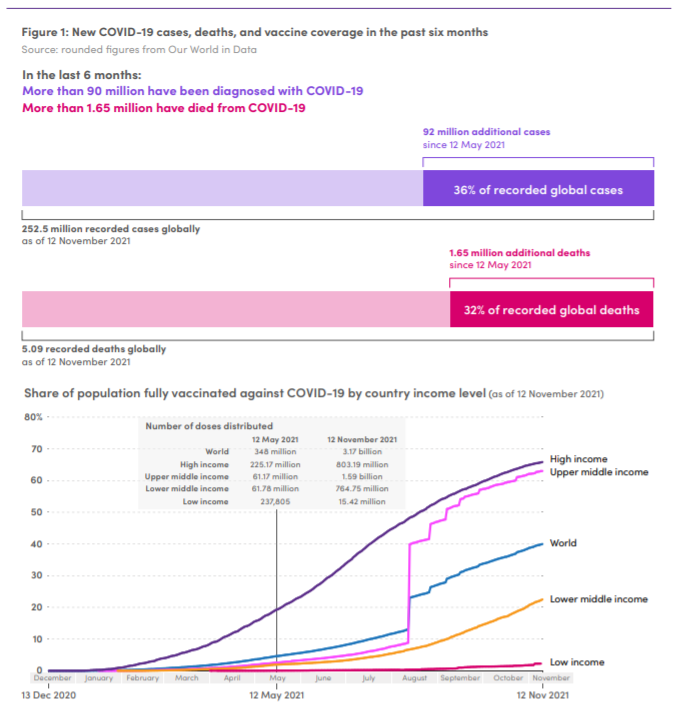
More than 67% of the population of all high-income countries has been fully vaccinated against COVID-19, but in low-income countries fewer than 5% of people have received even one dose, and that figure hovers even lower in many.
World Health Organization (WHO) targets call for 40% of the population of each country to be fully vaccinated by the end of 2021 and 70% by mid-2022. These targets represent a minimum achievable goal based on vaccine supply forecasts — clearly vaccination rates would need to be far higher to protect health systems from overload.
Yet even so, the world is failing to meet them. On the current track, 75 countries will miss the 40% target set for the end of this year.
The Independent Panel called for high-income countries with an adequate supply pipeline to redistribute at least one billion vaccine doses to LMICs by 1 September 2021.
They did not meet that target. As of 16 November, 1,494 billion doses have been committed through the Advance Market Commitment (AMC) window of the COVAX Facility, of which 256.5 million had been delivered.3
Meanwhile, the capacity of low- and middle-income countries to purchase vaccines is squeezed by confidential high-cost deals between manufacturers and wealthy countries as they add booster doses to their immunization programmes, despite powerful arguments against this on equity grounds.4, 5
“How many more deaths must it take before the … excess vaccines in the possession of the advanced countries of the world will be shared with those who [have] simply no access to vaccines?” — Prime Minister Mia Mottley of Barbados, at the 76th UN General Assembly
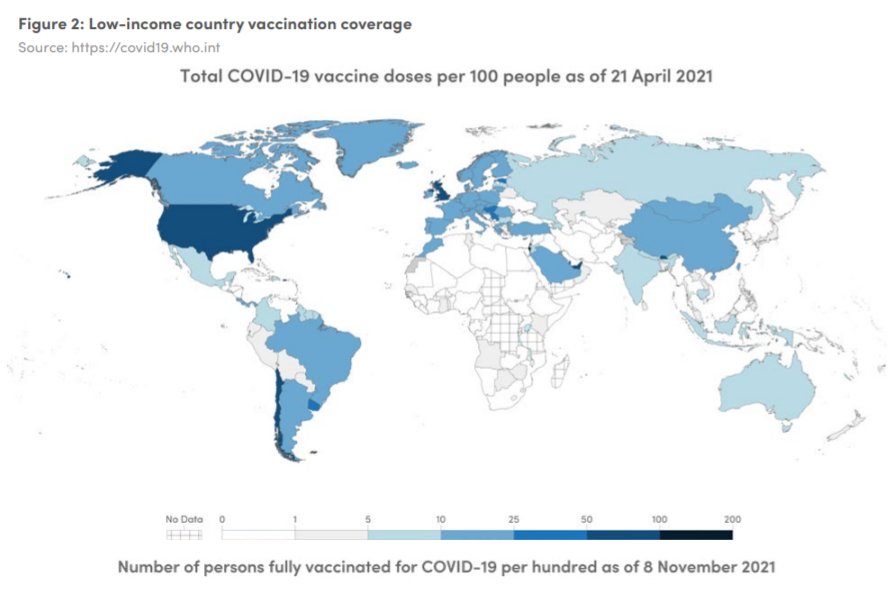
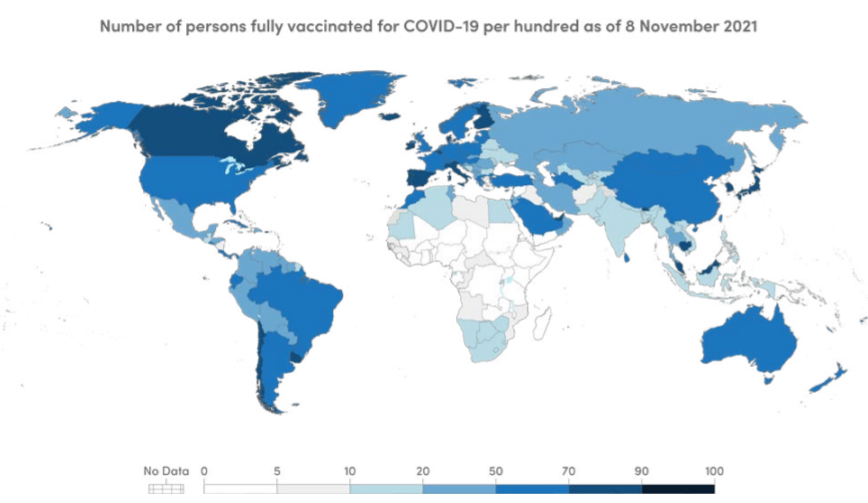

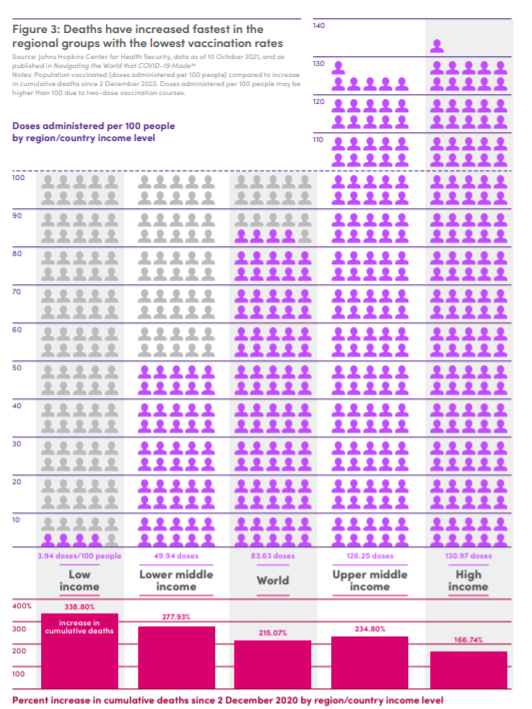
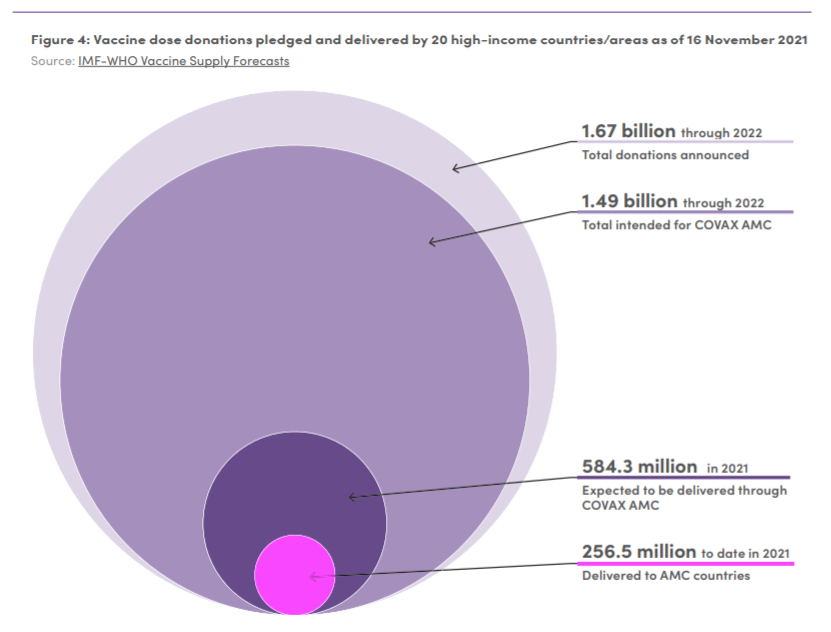
Countries and manufacturers have made substantial commitments to provide access to additional doses globally both bilaterally and through COVAX, but delivery has fallen far short of these promises.
In low-income countries especially, actual delivery of doses is running at only 15% of the expected or secured number of doses.7 The G7 nations have promised two billion vaccine doses for lower income countries over 2021 and 2022, but largely without transparent plans for delivery.8 Similarly, China also announced that it would provide two billion vaccine doses to the world by the end of 2021 and has committed to donate 5% of those (100 million doses) to developing countries.9 A number of other countries have made commitments either to share doses or fund the purchase of vaccines, bilaterally and through COVAX. The lack of transparent vaccine delivery schedules makes it difficult to track the extent to which commitments are being honoured and undermines planning for immunization programmes in low- and middleincome countries. Important regional initiatives, such as the African Delivery Vaccines Alliance and the Africa Vaccine Acquisition Task Team need clarity from the global market and supply system in order to make plans and deliver on them. Inconsistent delivery, including dumping large shipments at the last minute, is a potential waste of vaccine and therefore a wasted opportunity to protect people.
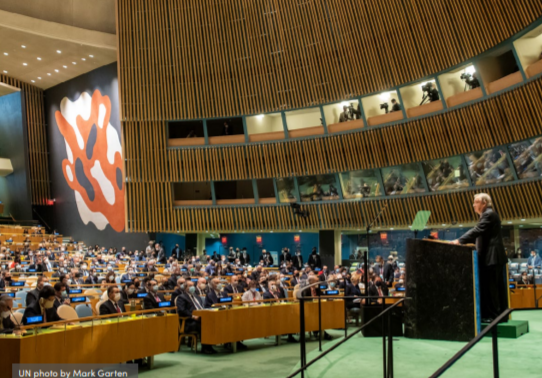
A Global Health Threats Council remains key to the reforms required.
Conclusion: The next six months are critical
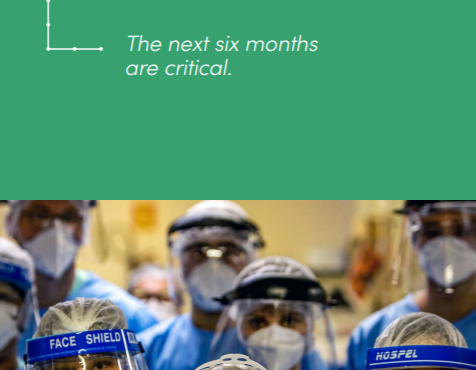
In May 2021, the Independent Panel called for the rapid implementation of a package of recommendations to address the current COVID-19 crisis and to mitigate the health, social, and economic impacts of future health threats. In the six months since, the pandemic has continued to cause havoc around the world.
Despite the promise and availability of vaccines, they have not been delivered equitably.
Further, widespread vaccine coverage alone cannot end the pandemic — ongoing public health measures will continue to be required. It is clear that the world urgently needs renewed commitment to multilateral leadership and mutual accountability.
We are encouraged that a wide range of voices and forces are expressing determination to make fundamental and systemic change to the global pandemic preparedness and response architecture.
That array needs to become a concerted global coalition for action. Different perspectives and national and sectoral interests must not be allowed to stand in the way of effective and lasting change in pandemic preparedness and response. Successive waves of the pandemic continue to challenge life in every nation, high-, middle- and low-income, and continue to mercilessly batter the most vulnerable.
The United Nations General Assembly, as the most inclusive body of all the world’s nations, must soon respond to the historic challenge posed by COVID-19.
“The recommendations of the Independent Panel for Pandemic Preparedness and Response must be a starting point for urgent reforms to strengthen the global health architecture.” António Guterres, UN Secretary-General
A political declaration of the United Nations General Assembly, agreed at the highest level and with the commitment of all the world’s nations to it, with a new Global Health Threats Council at its centre, would be a critical step towards transforming pandemic preparedness and response.
It is urgent also to develop a shared commitment to a practical plan, based on equitable and sustainable foundations and pertinent to every region and every country, to bring the COVID-19 pandemic to a rapid close.
There is no single magic bullet to end pandemics, but there is a combination of measures that will: commitment, finance, global public goods, alerts and preparedness, and leadership.
It’s time now to make change happen. We call on all leaders and foreign, finance, and health ministers, working through the mechanisms of the international system, to put their weight behind decisive moves at the UN General Assembly, the World Health Assembly, and the international and regional financial institutions to enable that change.
Analysis shows very low full coverage in the poorest countries — in some under 1% of the population are fully vaccinated.
Selected Infographic (or image)

Key messages
More than 67% of the population of all high-income countries has been fully vaccinated against COVID-19, but in low-income countries fewer than 5% of people have received even one dose, and that figure hovers even lower in many.
World Health Organization (WHO) targets call for 40% of the population of each country to be fully vaccinated by the end of 2021 and 70% by mid-2022. These targets represent a minimum achievable goal based on vaccine supply forecasts — clearly vaccination rates would need to be far higher to protect health systems from overload.
Yet even so, the world is failing to meet them. On the current track, 75 countries will miss the 40% target set for the end of this year.
The Independent Panel called for high-income countries with an adequate supply pipeline to redistribute at least one billion vaccine doses to LMICs by 1 September 2021.
They did not meet that target. As of 16 November, 1,494 billion doses have been committed through the Advance Market Commitment (AMC) window of the COVAX Facility, of which 256.5 million had been delivered.3
Meanwhile, the capacity of low- and middle-income countries to purchase vaccines is squeezed by confidential high-cost deals between manufacturers and wealthy countries as they add booster doses to their immunization programmes, despite powerful arguments against this on equity grounds.4, 5
“How many more deaths must it take before the … excess vaccines in the possession of the advanced countries of the world will be shared with those who [have] simply no access to vaccines?” — Prime Minister Mia Mottley of Barbados, at the 76th UN General Assembly

22 November 2021, LONDON — Reform on pandemic preparedness and response is underway, but to end this pandemic and prepare for the next global health threat, Heads of State and Government must come together to make faster progress.
Reform on pandemic preparedness and response is underway, but to end this pandemic and prepare for the next global health threat, Heads of State and Government must come together to make faster progress.
In a six-month accountability report, the former Co-Chairs of The Independent Panel for Pandemic Preparedness and Response assess the linked areas of leadership and governance, financing, equity, a new legal instrument, and a stronger WHO.
The Co-Chairs presented their findings today in the new report titled Losing Time: End this pandemic and secure the future, during a Chatham House event.
“ The world now needs these conversations to come together — especially at the UN General Assembly, where Heads of State and Government can declare their commitments and a pathway to a more secure world, including to a new Global Health Threats Council to provide much needed leadership and accountability.”
In May 2021, Her Excellency Ellen Johnson Sirleaf and the Right Honourable Helen Clark issued the Independent Panel’s findings following a nine-month deep-dive into the global and national response to COVID-19. They recommended immediate actions to end COVID-19 and a package of international, interlinked reform solutions intended to stop a future outbreak from becoming another devastating pandemic. In today’s report, they summarize progress on each recommendation in a comprehensive dashboard.

Uneven and fragmented efforts
The former Co-Chairs find uneven and sometimes fragmented efforts as the pandemic continues at pace.
They note that in just the six months since tabling their plan for action at least 90 million more people have contracted COVID and 1.65 million more people have died — and those are only the illnesses and deaths that have been recorded.
in just the six months … at least 90 million more people have contracted COVID and 1.65 million more people have died …
Of grave urgent concern remains vaccine inequity — which has changed very little since May 2021. Analysis shows very low full coverage in the poorest countries — in some under 1% of the population are fully vaccinated.
“ Our Panel calculated that there were at least one billion doses available to redistribute to low-income countries by 1 September this year,” said Her Excellency Ellen Johnson Sirleaf.
“ Yet while wealthy countries have made public pledges, just a fraction of redistributed doses have actually been delivered. The idea that a poor health worker is unprotected while the healthy and wealthy receive booster doses should present a deep moral quandary. To this there is only one solution — vaccine equity.”
… very low full coverage in the poorest countries — in some under 1% of the population are fully vaccinated.
The former Co-Chairs say that global health cannot be left hostage to a pharmaceutical industry which buys up patents and develops them in the interest of making profits.
They say that the development of a true end-to-end global public goods model remains the answer.
The report also warns that vaccine pledges can be soured by inconsistent delivery and dumping of near-expired vaccines — creating “a wasted opportunity to protect people.”
Some progress, much more to be done
With regard to specific progress and the work remaining, the Co-Chairs point to:
Leadership and Governance
- The UN Secretary General, António Guterres, stated to the U.S.-hosted Global COVID-19 Summit in September that “The recommendations of the Independent Panel for Pandemic Preparedness and Response must be a starting point for urgent reforms to strengthen the global health architecture.”
- Growing momentum for a UN special summit, with support from many countries and the Global Pandemic Preparedness Monitoring Board
- Statements in support of a new leader-led Global Health Threats Council, from Heads of State and Government and the G2O High-level Independent Panel on Financing the Global Commons for Pandemic Preparedness and Response (G20 HLIP)
- The report stresses that “governance without finance lacks teeth; and finance without governance lacks accountability.” The Independent Panel recommended that the Global Health Threats Council should have the task of allocating and monitoring funding from a new financing mechanism to existing regional and global institutions which can support development of pandemic preparedness and response capacities.
- The report notes growing convergence on the need to raise new financing for pandemic preparedness (of at least US$10 billion annually), including from the G20 HLIP, and the United States and Norway proposal for a Financial Intermediary Fund.
- The report also underscores the importance of having a pool of response funding — in May the Panel recommended that up to US$ 100 billion be made available in case of pandemic threat.
Equity for vaccines, diagnostics and treatments
- Progress includes the pledged donations of vaccine through 2022, though delivery must be planned, faster, and carried out transparently
- The announcements of new mRNA vaccine production hubs in Latin America and on the African continent
- Recent announcements about the latest oral antivirals becoming available to several dozen countries through the Medicines Patent Pool
Strengthening WHO and a Pandemic Treaty
- On the need for better surveillance and more rapid information sharing, the Co-Chairs welcome the new pathogen sharing and digital surveillance institutes being established in Switzerland and Germany.
- The report notes the continued need for a much larger portion of WHO funds to come from assessed contributions rather than being earmarked.
- WHO Member State Working Groups are discussing the Panel’s recommendations for strengthening and more sustainably financing WHO. The World Health Assembly (WHA) Special Session this month will focus on whether to launch negotiations for new legal instruments, and reforms to WHO will be considered at the regular WHA session next May.
Purpose, urgency, results
The Co-Chairs warn however about the potential for protracted discussion at the World Health Assembly and the United Nations when the need for reforms is urgent, and ask Member States to work with purpose towards real results that will protect people.
“ We urge Member States to spend less time debating commas in committees while a pandemic still rages, people are dying, and a new pandemic threat could arise anytime and anywhere,” said Helen Clark.
Overall, the report underscores that more focused and coherent work be done on a reform package with urgency. The Co-Chairs stress that the reforms required now can both contribute to ending the current pandemic and preventing another.
In their preface, the Co-Chairs write that much of the groundwork for reforms has been done and that it’s now imperative to seize the moment to make change.
“ What is needed now is for countries to make a final push so that the opportunity to create a safer world does not slip through our fingers. We ask: if this pandemic representing a threat to the health and wellbeing of humanity worldwide cannot catalyse real change, what will?”
For more information:
The report Losing Time: End this pandemic and secure the future is available at
www.TheIndependentPanel.org , as are all Independent Panel materials.
Originally published at https://mailchi.mp.
ORIGINAL PUBLICATION (excerpted below)
________________________________________________________

Homepage – The Independent Panel for Pandemic Preparedness and Response
Homepage An Evidence-based Quest to Protect Human Health © WHO New: the Co-Chairs’ six month accountability report …theindependentpanel.org
Losing time: End this pandemic and secure the future
Progress six months after the report of the Independent Panel for Pandemic Preparedness and Response
H.E. Ellen Johnson Sirleaf and Rt Hon. Helen Clark
Preface (excerpted)
Six months ago, we presented the report of the Independent Panel for Pandemic Preparedness and Response to the World Health Assembly and the world at large. We were honoured to co-chair the Panel and to work with eleven distinguished leaders on a meticulous analysis of the international response to COVID-19 and on recommendations on what needed to change.
We recommended a package of reforms required to help stop a future outbreak from becoming a pandemic, addressing leadership and accountability, governance, financing, equity and global public goods, and WHO’s authority and independence.
We also recommended urgent actions to end the devastation of COVID-19. There is progress, but it is not fast or cohesive enough to bring this pandemic to an end across the globe in the near term, or to prevent another. Waves of disease and death continue — as people in the northern hemisphere move indoors, fatigue with restrictions sets in, vaccine coverage and other countermeasures remain uneven, and people in the poorest countries have almost no access to vaccines.
The world is losing time. The trajectory of the pandemic over the past six months has underscored the vital need for a package of reforms to international systems, as our Panel recommended in May.
The vast immunization gulf between the richest and poorest countries of the world jeopardizes the health of everyone on the planet. It is also increasingly clear that the challenges of SARS-CoV-2 cannot be solved by vaccination alone, but rather require ongoing public health measures, and sustained whole-of-society efforts to protect the most vulnerable and build community resilience.
Initiatives to create a leader-level council for pandemic response continue to be discussed. Such a mechanism is urgently needed now, both to help halt this pandemic and to prevent a future one. Trust among countries, between citizens and governments, and between science and leadership, continues to falter amid a barrage of misinformation and expression of narrow self-interest.
The manifest failures of the COVID-19 response to date should motivate all stakeholders to make serious reforms and minimise the impact of future disease threats.
Countries are making efforts to mobilise resources to sustain a new approach to pandemic preparedness and response. Much of the groundwork to identify the steps to reform has been done — what is needed now is for countries to make a final push so that the opportunity to create a safer world does not slip through our fingers. Planning for future pandemics and fighting the current one call for the same reforms. We ask: if this pandemic cannot catalyse real change, what will?
Rt Hon. Helen Clark
H.E. Ellen Johnson Sirleaf
The Independent Panel called for 1 billion redistributed doses by 1 September. To date, one quarter of that amount has been delivered to the poorest countries.
1.Vaccine inequity (excerpt)
In the six months since the Panel presented its report, COVID-19 has infected more than 92 million more people and at least 1.6 million more people have died.
The reported global death toll, itself an under-estimate, now exceeds five million.1
The Delta variant, just emerging six months ago, now predominates worldwide.
The pandemic continues to have a profound impact on lives and livelihoods and is exacerbating inequality as economic recovery begins to take hold in wealthier countries but falters in the poorest.

More than 67% of the population of all high-income countries has been fully vaccinated against COVID-19, but in low-income countries fewer than 5% of people have received even one dose, and that figure hovers even lower in many.
World Health Organization (WHO) targets call for 40% of the population of each country to be fully vaccinated by the end of 2021 and 70% by mid-2022. These targets represent a minimum achievable goal based on vaccine supply forecasts — clearly vaccination rates would need to be far higher to protect health systems from overload.
Yet even so, the world is failing to meet them. On the current track, 75 countries will miss the 40% target set for the end of this year.
The Independent Panel called for high-income countries with an adequate supply pipeline to redistribute at least one billion vaccine doses to LMICs by 1 September 2021.
They did not meet that target. As of 16 November, 1,494 billion doses have been committed through the Advance Market Commitment (AMC) window of the COVAX Facility, of which 256.5 million had been delivered.3
Meanwhile, the capacity of low- and middle-income countries to purchase vaccines is squeezed by confidential high-cost deals between manufacturers and wealthy countries as they add booster doses to their immunization programmes, despite powerful arguments against this on equity grounds.4, 5
“How many more deaths must it take before the … excess vaccines in the possession of the advanced countries of the world will be shared with those who [have] simply no access to vaccines?” — Prime Minister Mia Mottley of Barbados, at the 76th UN General Assembly





Countries and manufacturers have made substantial commitments to provide access to additional doses globally both bilaterally and through COVAX, but delivery has fallen far short of these promises.
In low-income countries especially, actual delivery of doses is running at only 15% of the expected or secured number of doses.7 The G7 nations have promised two billion vaccine doses for lower income countries over 2021 and 2022, but largely without transparent plans for delivery.8 Similarly, China also announced that it would provide two billion vaccine doses to the world by the end of 2021 and has committed to donate 5% of those (100 million doses) to developing countries.9 A number of other countries have made commitments either to share doses or fund the purchase of vaccines, bilaterally and through COVAX. The lack of transparent vaccine delivery schedules makes it difficult to track the extent to which commitments are being honoured and undermines planning for immunization programmes in low- and middleincome countries. Important regional initiatives, such as the African Delivery Vaccines Alliance and the Africa Vaccine Acquisition Task Team need clarity from the global market and supply system in order to make plans and deliver on them. Inconsistent delivery, including dumping large shipments at the last minute, is a potential waste of vaccine and therefore a wasted opportunity to protect people.

A Global Health Threats Council remains key to the reforms required.
Conclusion: The next six months are critical

In May 2021, the Independent Panel called for the rapid implementation of a package of recommendations to address the current COVID-19 crisis and to mitigate the health, social, and economic impacts of future health threats. In the six months since, the pandemic has continued to cause havoc around the world.
Despite the promise and availability of vaccines, they have not been delivered equitably.
Further, widespread vaccine coverage alone cannot end the pandemic — ongoing public health measures will continue to be required. It is clear that the world urgently needs renewed commitment to multilateral leadership and mutual accountability.
We are encouraged that a wide range of voices and forces are expressing determination to make fundamental and systemic change to the global pandemic preparedness and response architecture.
That array needs to become a concerted global coalition for action. Different perspectives and national and sectoral interests must not be allowed to stand in the way of effective and lasting change in pandemic preparedness and response. Successive waves of the pandemic continue to challenge life in every nation, high-, middle- and low-income, and continue to mercilessly batter the most vulnerable.
The United Nations General Assembly, as the most inclusive body of all the world’s nations, must soon respond to the historic challenge posed by COVID-19.
“The recommendations of the Independent Panel for Pandemic Preparedness and Response must be a starting point for urgent reforms to strengthen the global health architecture.” António Guterres, UN Secretary-General
A political declaration of the United Nations General Assembly, agreed at the highest level and with the commitment of all the world’s nations to it, with a new Global Health Threats Council at its centre, would be a critical step towards transforming pandemic preparedness and response.
It is urgent also to develop a shared commitment to a practical plan, based on equitable and sustainable foundations and pertinent to every region and every country, to bring the COVID-19 pandemic to a rapid close.
There is no single magic bullet to end pandemics, but there is a combination of measures that will: commitment, finance, global public goods, alerts and preparedness, and leadership.
It’s time now to make change happen. We call on all leaders and foreign, finance, and health ministers, working through the mechanisms of the international system, to put their weight behind decisive moves at the UN General Assembly, the World Health Assembly, and the international and regional financial institutions to enable that change.



